No Results Found
The page you requested could not be found. Try refining your search, or use the navigation above to locate the post.

“In the Alberta Rockies, advocates say feral herds are being wrongfully blamed for ecological damage that the province wants to contain, if necessary, with population control.” – The Globe and Mail.
Below we are including a few excerpts from an article that appeared in The Globe and Mail on September 10, 2024.
We also think it is important to note (scroll down) that the Alberta Minister of Forestry and Parks appears to have a vested interest in the eradication of wild horses.
Glover, sitting on a log in the very same forest this summer, says he remembers the protest as a “great resistance” that helped stop the killing of dozens of feral horses near Sundre, Alta. But the resistance is far from over, he stressed, as the provincial government continues to threaten the horses’ very existence.
The carefree creatures are difficult to spot as they roam the foothills of the Canadian Rockies. But Glover, having been around them for years, knows where to look. He calls the horses by name – Stirling, Maverick, One-Eyed Jack – as they graze in fields, gallop through the trees or play fight.
The highest concentration of wild horses in Alberta is in the Sundre area. The province estimated there were 969 horses in 2023, which is just shy of the 1,000-population threshold that triggers immediate action to reduce the herd size through adoption, contraception and, in extreme cases, killing. HAWS, which conducts its own aerial surveys, believes the government’s count is inflated.
Pam Davidson, press secretary for Forestry and Parks Minister Todd Loewen, said there is no cull currently “planned or anticipated” in Alberta. She said the government is adhering to guidelines in its Feral Horse Management Framework, which was developed by a committee that includes wilderness experts, Indigenous groups and academics. “Future committee meetings will include discussions on non-lethal methods of managing feral horses, including adoption and contraception,” Ms. Davidson said.
Alberta Minister of Forestry and Parks, Todd Loewen who introduced the wild horse cull was allegedly denied being appointed to that position – by the (Alberta) Ethics Commissioner – and yes, it’s a cull despite his stating otherwise.
Why was he (allegedly) denied? Could it be because he at one time owned a hunting/outfitting business?
It certainly appears he sidestepped being denied by transferring his hunting/outfitting business to his family.
Talk about a fox minding the hen house.
Politicians count on and often get away with the public not doing due diligence.
Please join us in reaching out to the Ethics Commissioner and asking why Loewen was initially denied the position of Minister of Forestry and Parks.
Let’s see what they have to say – we want them to know that the public is watching and aware.
A follow up conversation/letter can be to ask, “Why is it not a conflict of interest when the outfitting/hunting business is still in his immediate family?”.
Office of the Ethics Commissioner
Suite 1250, 9925 – 109 Street NW
Edmonton, Alberta, Canada T5K 2J8
Telephone Number: (780) 422-2273
Fax Number: (780) 422-2261
E-mail Address: info@ethicscommissioner.ab.ca



The page you requested could not be found. Try refining your search, or use the navigation above to locate the post.
With your help we've saved 16 horses in the last few months -- horses who would otherwise have been shipped directly to slaughter -- and we currently have room to save 4 more.
Thank you to all who have so generously contributed!
UPDATE JAN. 18, 2025: It’s been a challenging whirlwind but 16 horses have been saved, 2 placed in permanent homes which means we have room to save 4 more!
Of course, the initial expense of buying horses from First Nations (or kill buyers) so they are not shipped to slaughter is not the biggest nut to crack. Hay, feed, vetting, farrier, and other costs are needed in addition to funds to initially purchase horses to prevent them from being shipped to slaughter - or being left to languish in pens awaiting the same fate.
We always hate to ask but if you are able to help we would love to be able to fill each of the foster homes before these groups of horses are shipped.
Again, we can’t save them all but with your help we can save a total of 20!

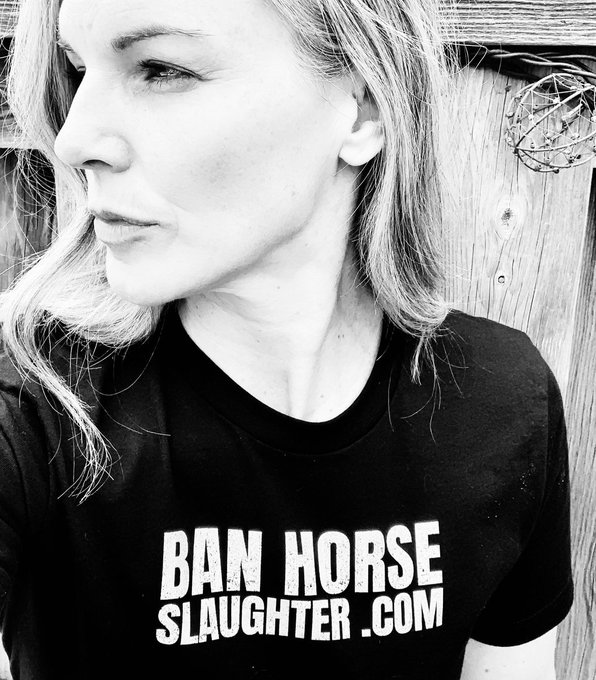
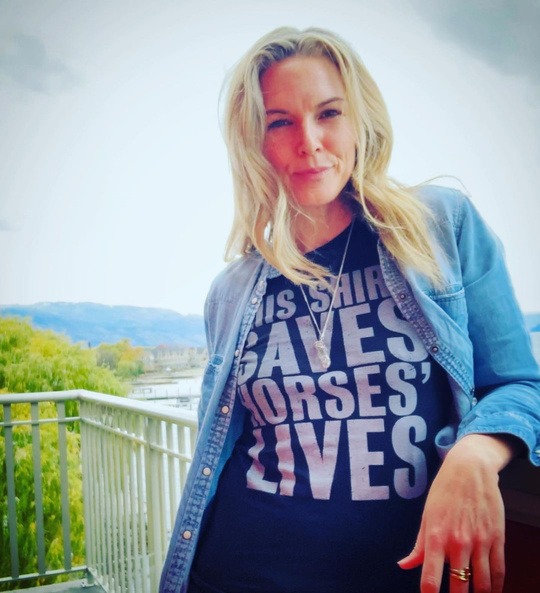
The page you requested could not be found. Try refining your search, or use the navigation above to locate the post.
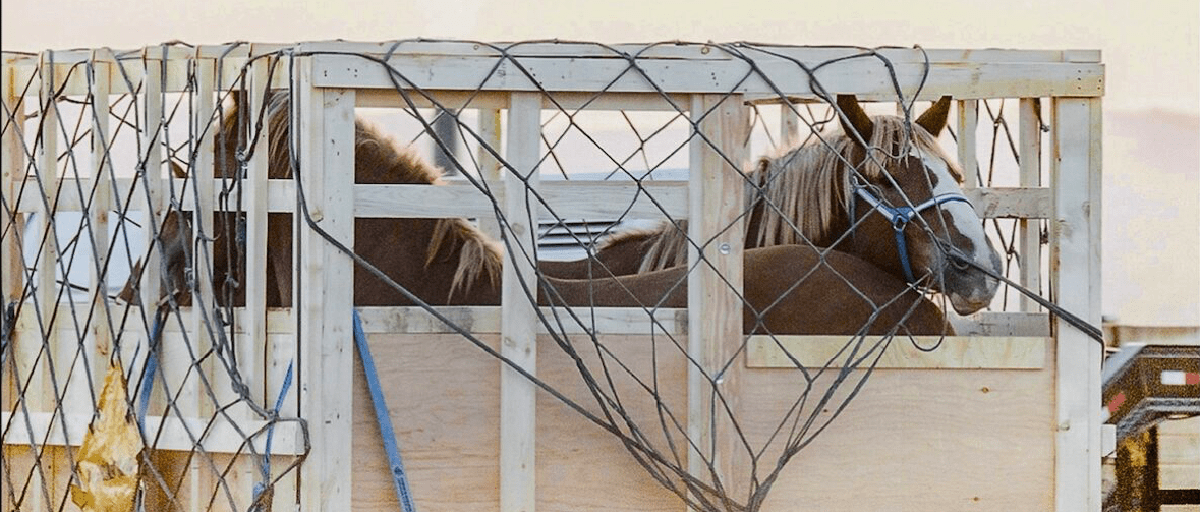
The Honourable Lawrence MacAulay, the current Minister of Agriculture and Agri-Food, has the power to end the inhumane export of horses by air for slaughter by enacting a regulatory amendment.
Help spread the word by sharing this email campaign with friends and family! You can also support the cause by donating—your contribution will help fund advertising efforts to raise awareness and push for change. Every action makes a difference!
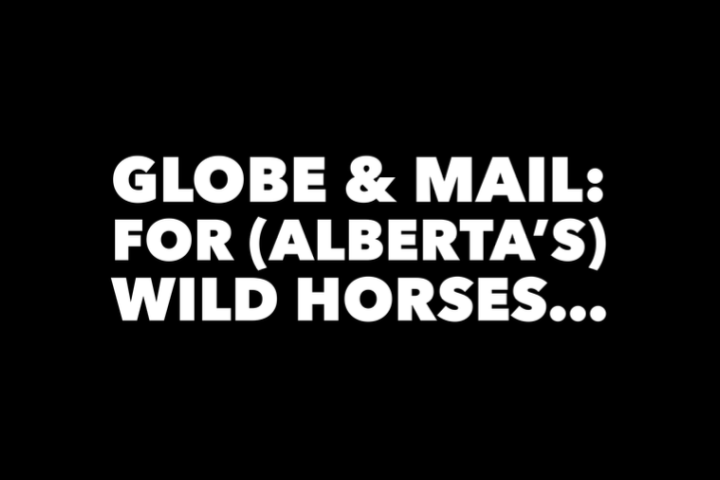
On a breezy day in June, two young stallions, chocolate-brown coats glistening, circle each other before jumping into the air and wrapping their front legs around each other’s necks. A lone white stallion disappears into a forested area nearby while other horses, in shades of grey, brown and black, blend into the rolling landscape.
But what these carefree creatures don’t know is that they are at the centre of a decade-long battle between a wild horse advocacy organization and the provincial government. At stake is the horses’ very existence.
Alberta argues it has to manage the wild horse population to prevent damage to its pasture land – it says the horses’ grazing habits contribute to ecological decline. The province has, in the past, ordered the cull of hundreds of horses.
Meanwhile, the Help Alberta Wildies Society (HAWS), which was formed in 2014 to fight a government-sanctioned slaughter, asserts that the province’s concerns are overblown and that the population must be protected at all costs.


The page you requested could not be found. Try refining your search, or use the navigation above to locate the post.
With your help we've saved 16 horses in the last few months -- horses who would otherwise have been shipped directly to slaughter -- and we currently have room to save 4 more.
Thank you to all who have so generously contributed!
UPDATE JAN. 18, 2025: It’s been a challenging whirlwind but 16 horses have been saved, 2 placed in permanent homes which means we have room to save 4 more!
Of course, the initial expense of buying horses from First Nations (or kill buyers) so they are not shipped to slaughter is not the biggest nut to crack. Hay, feed, vetting, farrier, and other costs are needed in addition to funds to initially purchase horses to prevent them from being shipped to slaughter - or being left to languish in pens awaiting the same fate.
We always hate to ask but if you are able to help we would love to be able to fill each of the foster homes before these groups of horses are shipped.
Again, we can’t save them all but with your help we can save a total of 20!



The page you requested could not be found. Try refining your search, or use the navigation above to locate the post.

The Honourable Lawrence MacAulay, the current Minister of Agriculture and Agri-Food, has the power to end the inhumane export of horses by air for slaughter by enacting a regulatory amendment.
Help spread the word by sharing this email campaign with friends and family! You can also support the cause by donating—your contribution will help fund advertising efforts to raise awareness and push for change. Every action makes a difference!
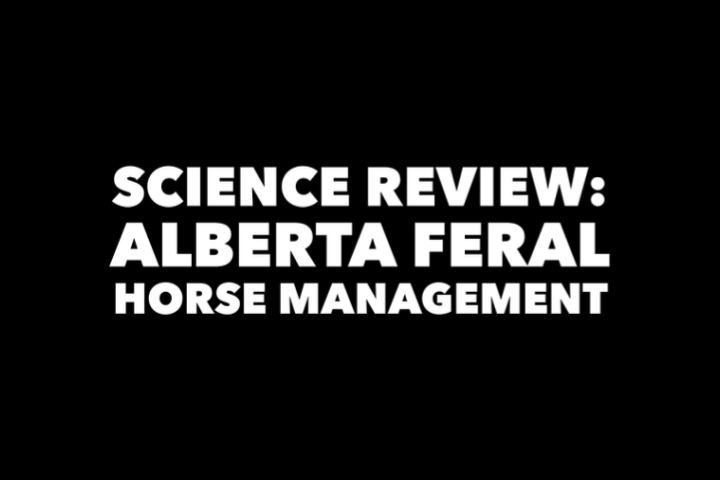
ABOUT THE AUTHOR
As a long-practicing registered professional biologist (RPBio) in British Columbia, I have had a wide range of experience in wildlife research, environmental impacts, cumulative effects analysis, and management/conservation issues in western Canada. I have headed numerous research projects, including on Chilcotin free-roaming horses, mammal inventory in Yoho National Park, grizzly bears, black bears, western toads, mountain goats, Roosevelt elk, spirit (Kermode) bears, and other species. I am well familiar with the ecology of the Alberta Foothills having mapped and studied grizzly bear habitat in Kananaskis Country for three years with Dr. Stephen Herrero, and for producing a report for Alberta Fish and Wildlife on the history of the grizzly bear in K-Country. In Alberta, I was also a waterfowl researcher on the first environmental impact study of the Athabasca Tar Sands (Syncrude), and a wildlife researcher on a gas pipeline from Chief Mountain Alberta to Trail, British Columbia.
I have conducted considerable ungulate research, including on barren-ground caribou, bighorn sheep, Roosevelt elk, and mountain goats. In 2015/2016, I carried out a professional review of feral horse management in Alberta.
Over the past 20 years, my research on wild horses in the BC Chilcotin has included field research on habitat use and response to wildfires, as well as genetic studies. I have also worked with the Xeni Gwet’in-Tsilhqot’in Nation on a wild horse management plan and guidelines for wildlife and wild horse tourism viewing. I recently published a book on my wild horse research titled The Wild Horses of the Chilcotin: Their History and Future, which won the 2024 Basil Stuart-Stubbs Prize for the best scholarly book by a Canadian author on a BC subject. It was given a starred review by the US Booklist for a work judged to be outstanding in its genre.
I have produced over 100 wildlife reports, including a number of publications in peer- reviewed journals. I have produced or co-authored three reports on Chilcotin wild horses and have been a co-author of two peer-reviewed scientific papers related to wild horses, one on the diet of Chilcotin wolves and the other on the spread of the domestic horse across the Americas, which won the prestigious 2024 AAAS Newcomb Cleveland Prize for outstanding contribution to science.
Cover Photo by Duane Star Photography


The page you requested could not be found. Try refining your search, or use the navigation above to locate the post.
With your help we've saved 16 horses in the last few months -- horses who would otherwise have been shipped directly to slaughter -- and we currently have room to save 4 more.
Thank you to all who have so generously contributed!
UPDATE JAN. 18, 2025: It’s been a challenging whirlwind but 16 horses have been saved, 2 placed in permanent homes which means we have room to save 4 more!
Of course, the initial expense of buying horses from First Nations (or kill buyers) so they are not shipped to slaughter is not the biggest nut to crack. Hay, feed, vetting, farrier, and other costs are needed in addition to funds to initially purchase horses to prevent them from being shipped to slaughter - or being left to languish in pens awaiting the same fate.
We always hate to ask but if you are able to help we would love to be able to fill each of the foster homes before these groups of horses are shipped.
Again, we can’t save them all but with your help we can save a total of 20!



The page you requested could not be found. Try refining your search, or use the navigation above to locate the post.

The Honourable Lawrence MacAulay, the current Minister of Agriculture and Agri-Food, has the power to end the inhumane export of horses by air for slaughter by enacting a regulatory amendment.
Help spread the word by sharing this email campaign with friends and family! You can also support the cause by donating—your contribution will help fund advertising efforts to raise awareness and push for change. Every action makes a difference!
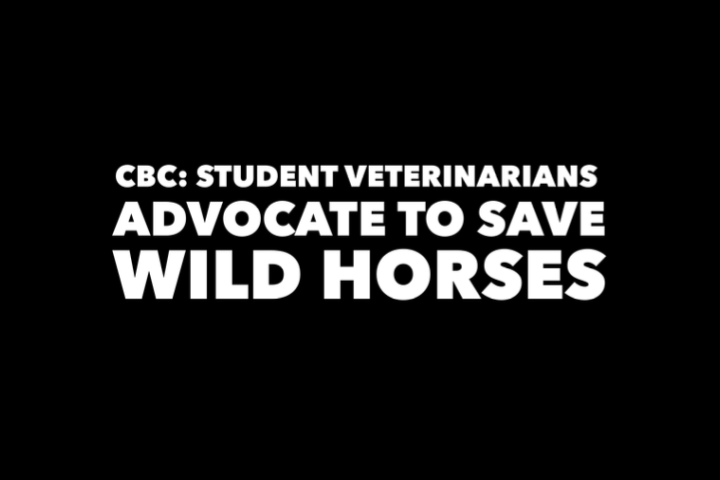



The page you requested could not be found. Try refining your search, or use the navigation above to locate the post.
With your help we've saved 16 horses in the last few months -- horses who would otherwise have been shipped directly to slaughter -- and we currently have room to save 4 more.
Thank you to all who have so generously contributed!
UPDATE JAN. 18, 2025: It’s been a challenging whirlwind but 16 horses have been saved, 2 placed in permanent homes which means we have room to save 4 more!
Of course, the initial expense of buying horses from First Nations (or kill buyers) so they are not shipped to slaughter is not the biggest nut to crack. Hay, feed, vetting, farrier, and other costs are needed in addition to funds to initially purchase horses to prevent them from being shipped to slaughter - or being left to languish in pens awaiting the same fate.
We always hate to ask but if you are able to help we would love to be able to fill each of the foster homes before these groups of horses are shipped.
Again, we can’t save them all but with your help we can save a total of 20!



The page you requested could not be found. Try refining your search, or use the navigation above to locate the post.

The Honourable Lawrence MacAulay, the current Minister of Agriculture and Agri-Food, has the power to end the inhumane export of horses by air for slaughter by enacting a regulatory amendment.
Help spread the word by sharing this email campaign with friends and family! You can also support the cause by donating—your contribution will help fund advertising efforts to raise awareness and push for change. Every action makes a difference!
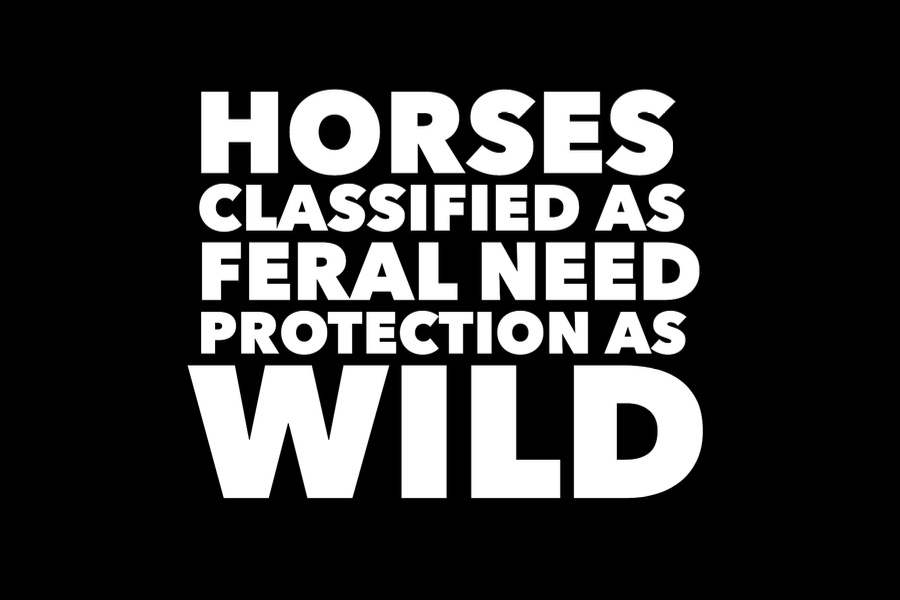
You may have noticed since the shooting earlier this month of 17 wild horses in British Columbia, Canada that there’s been an increase in the chatter about whether horses in British Columbia and other parts of Canada who run free are wild or feral.
You may also have noticed that we rarely post on social media, or on this site without a call to action also known as a CTA.
We like to educate and raise awareness, then provide solutions, and courses of action that we are taking to make a difference and that others can join us in doing to help horses and other equines. Whether that be stopping the slaughter of horses within Canada, for human consumption or any purpose, including those imported from the USA for slaughter here (or in Mexico) or stopping the live export of horses from Canada to Japan – or anywhere else — for slaughter.
So what is the Call To Action (CTA) when it comes to helping horses like these 17 who were needlessly shot on Crown land?
That’s a good question. A very good question.
First, let’s start with a recent article in the Globe and Mail. (For our non-Canadian friends The Globe and Mail is a newspaper printed in five cities in western and central Canada and often referred to as the country’s “newspaper of record”. Current readership is estimated to be around 2 million.)
The article is titled: Wild horse slaughter in B.C. saddens, divides local community
And starts out:
The recent slaughter of 17 wild horses in British Columbia’s Interior devastated members of the local community who regard them as an ancient and enchanting part of the landscape. However, the horses are thought of by others as pests, grazing machines that out-compete important species for food and territory.
Even ecologists disagree on whether wild horses deserve more protection.
Cpl. Lepine anticipates charging whoever is responsible for the killings under the Prevention of Cruelty to Animals Act, which carries a maximum punishment of $75,000 in fines and two years in jail.
The free-roaming horses are culturally significant to the Skeetchestn Indian Band, a community with deep roots in horsemanship that has held a rodeo for well over 100 years, according to former band councillor Terry Deneault.
In a statement released Wednesday, the band said that it was “saddened” by the “heinous crime” that occurred
“As our stories tell us, we are connected to all animals that walk, fly and swim, and it is our responsibility to ensure that all life is respected and cared for,” the statement said.
“While these horses did not live on Skeetchestn’s land and the crime occurred outside of our community, we are mourning the unnecessary loss of wildlife that we share this beautiful landscape with.”
So the comments in the article from the former band council member tell us that at least some in the First Nations community most directly “related” to this herd of horses consider the horses to be wild.
Those comments pleased us greatly because as the title of the Globe and Mail article states, the local community is divided and that has been our personal experience when it comes to the wild horses of British Columbia.
We’ve experienced – NOT with this particular Band – some members of other First Nations Bands who when wild horses are being a nuisance the horses are wild, but at other times some of the horses are used for trail rides, then turned out to fend for themselves for the winters – including horses that are branded.
Perhaps even more disheartening, members of more than one band in B.C. routinely round up these wild horses and ship them directly to slaughter in Alberta for human consumption.
We are NOT saying this is the norm.
AND we also want to say that there are groups within many bands and WHOLE bands who are working hard to protect horses and who treat them with respect.
Back to the article…
In B.C., as in the rest of Canada save for a handful of small reserves, free-roaming horses aren’t considered “wild” since the government doesn’t consider them to be native to the land. They are instead branded as “feral,” which disqualifies them from most wildlife protections.
Wayne McCrory, a biologist in B.C. who has studied free-roaming horses in Canada extensively, thinks new legislation is necessary.
“It’s time to ramp up protection, both federal and provincial, in my opinion, to stop this senseless slaughter when some trigger-happy person just decides to take the law into his own hands,” Mr. McCrory said.
Mr. McCrory is involved in research on Chilcotin horses’ DNA that could prove they’re descendants of horses that arrived in Canada in the 1700s. This could help establish that the horses are native to the land and therefore eligible for protection.
So there it is, there is a possible call to action, a CTA. Reach out to your Member of Parliament and your BC MLA and ask them to designate this herd as wild horses.

We do need to say that the article continues with a different point of view, that being that wildland resources would be better served by protecting land from horses, in favour of harder to sustain wildlife species. You can read the full article here.
“It is acknowledged that these horses are of cultural significance to the local Skeetchestn Band.”
Police are asking anyone with information to call the
RCMP Livestock Section at 250-299-7462,
or email cory.lepine@rcmp-grc.gc.ca

THANK YOU to Lana Marie for sharing this NL Radio interview with biologist Wayne McCrory.



The page you requested could not be found. Try refining your search, or use the navigation above to locate the post.

The Honourable Lawrence MacAulay, the current Minister of Agriculture and Agri-Food, has the power to end the inhumane export of horses by air for slaughter by enacting a regulatory amendment.
Help spread the word by sharing this email campaign with friends and family! You can also support the cause by donating—your contribution will help fund advertising efforts to raise awareness and push for change. Every action makes a difference!
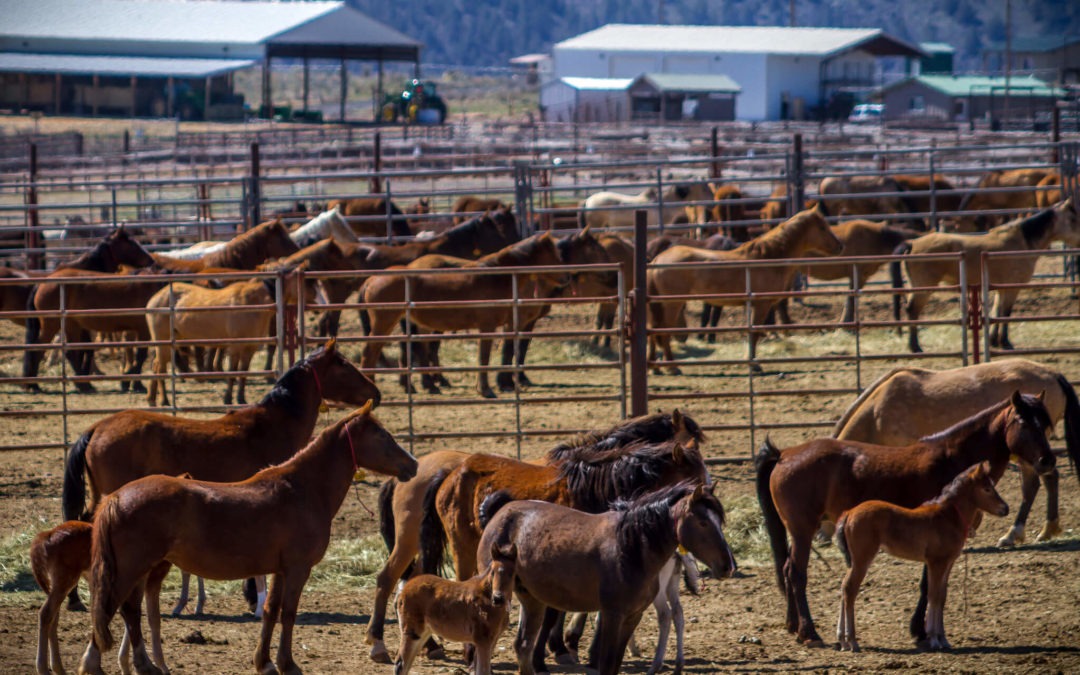
Picture: Bureau of Land Management Oregon
Excerpts from an article by Sam Block from https://newfoodeconomy.org
“Equine slaughter has been banned in America for over a decade. But the horse meat trade is still thriving.”
“For decades, BLM has rounded up wild horses and burros, aiming to do it every three to five years. Right now, a round-up is underway in Nevada. Last year, the bureau removed 11,472 wild horses and burros nationwide, more than in the three previous years combined. But its taxpayer-funded corrals and pastures, where horses wait to be sold or adopted, are nearing capacity.
The pressing question is where to put this growing population once existing options are full. Slaughtering horses for food is illegal in the U.S., but a market exists beyond our borders, in Europe, Japan and Russia. This is why brokers called “kill buyers” send trailers full of horses, both wild and domestic, into Mexico and Canada, where slaughter is legal. Last year, 81,573 horses made the trip.
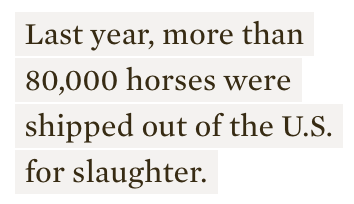
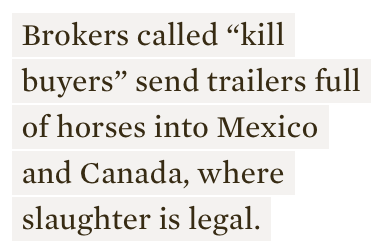
Wild horses are a minority in the disposable horse population, though they have an impact out of proportion to their numbers: They make it more difficult for ranchers to raise the cattle we eat. Once shipped out of the U.S., they are outnumbered at foreign slaughterhouses by privately-owned riding horses or racehorses sold for an array of reasons—too old, too small for a growing rider, too expensive, not fast enough, or excessive in some way that an owner found intolerable.”




The page you requested could not be found. Try refining your search, or use the navigation above to locate the post.

The Honourable Lawrence MacAulay, the current Minister of Agriculture and Agri-Food, has the power to end the inhumane export of horses by air for slaughter by enacting a regulatory amendment.
Help spread the word by sharing this email campaign with friends and family! You can also support the cause by donating—your contribution will help fund advertising efforts to raise awareness and push for change. Every action makes a difference!